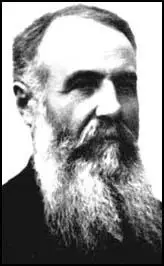Nikola Pasic

Nikola Pasic was born in Zajecar on the borders of Serbia and Bulgaria in 1845. He became involved in radical politics and in 1883 was condemned to death for his part in the plot against King Milan.
Pasic escaped to Austria and on the accession of King Peter in 1904 became prime minister of Serbia and held power for most of the next twenty years. He was largely responsible for Serbia's success in the Balkan Wars (1912-13) but was too moderate for those in the Black Hand movement.
In May 1914, Pasic was aware of the Black Hand plot to assassinate Archduke Ferdinand. He gave instructions for the three men who had been chosen for the deed, Gavrilo Princip, Nedjelko Cabrinovic, and Trifko Grabez to be arrested. However, his orders were not implemented and the three man arrived in Bosnia-Herzegovina where they joined forces with fellow conspirators, Danilo Ilic, Vaso Cubrilovic, Cvijetko Popovic, Misko Jovanovic and Veljko Cubrilovic.
Pasic now sent instructions to Jovan Jovanovic, the Serbian Minister in Vienna, to warn the Austrian government about the possibility of an assassination threat to Archduke Franz Ferdinand. On 5th June Jovanovic had a meeting with Leon von Bilinski, the Minister of Finance. However, Bilinski failed to pass on this message to the people who could have made the necessary precautions to prevent the assassination.
On 28th June, 1914, Archduke Franz Ferdinand and Duchess Sophie were killed by Gavrilo Princip. Several members of the Black Hand group in Sarajevo were arrested and interrogated by the Austrian authorities. Under extreme questioning some of the men claimed that three members from Serbia, Milan Ciganovic, Dragutin Dimitrijevic and Major Voja Tankosic, had organised the plot. On 23rd July, 1914, the Austro-Hungarian government demanded that the Serbian government arrested these three men and send them to face trial in Vienna.
On 25th July, 1914, Pasic told the Austro-Hungarian government that he was unable to hand over these three men as it "would be a violation of Serbia's Constitution and criminal in law". Three days later Austro-Hungarian declared war on Serbia.
During the first two years of the war the Serbian Army suffered a series of military defeats. Pasic, who blamed the Black Hand for the war, decided to disband the organisation. Dragutin Dimitrijevic, the chief of the Intelligence Department in the Serbian Army and the man behind the assassination was arrested and on 23rd May 1917, Dimitrijevic was found guilty of treason and sentenced to death.
After the Armistice Pisac was Serbia's representative to the Versailles Peace Conference and was instrumental in the creation of Yugoslavia. Pisac was prime minister on two more occasions: 1921-24 and 1924-26. Nikola Pasic died in 1926.

Primary Sources
(1) Jovan Jovanovic, reported statement to Leon von Billinski (5th June, 1914)
If that is true (Archduke Franz Ferdinand attending military maneuvers in Bosnia), I can assure Your Excellency that this will cause much discontent among the Serbs, who will consider it to be a provocative gesture. Maneuvers, under such circumstances are a dangerous thing. Some young Serb might put a live rather than a blank cartridge in his gun, and fire it. That bullet might hit the man who provoked him. Therefore it might be good and reasonable if Archduke Franz Ferdinand were not to go to Sarajevo.
